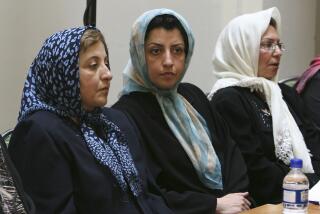Iranian Student Wins Essay Prize--in English
- Share via
Before 15-year-old Sohail Arbabi left Iran two years ago, he had witnessed a revolution that toppled Shah Mohammed Reza Pahlavi and seen the results of the Iran-Iraq war and widespread human rights abuses.
“He has seen a lot for a young man,” said Jane Downhower, Sohail’s world history teacher at Blair High School in Pasadena. “I think he has a maturity of perspective and reality that most Americans don’t have.”
Such experiences helped him win first place in a national essay contest sponsored by the United Nations Assn. of the U.S.A.
In his essay, “The United Nations: Looking to the Year 2000,” Sohail researched issues such as population growth, the environment, hunger and human rights.
He suggested several ways Americans can help solve today’s pressing world problems, such as promoting the release of political prisoners and collecting money to feed hungry nations.
“An individual can do a lot of things,” Sohail wrote. “The future needs all the people in the world to give their hands to each other, and work together.”
Sohail criticized the U.N.’s role in dealing with human rights and said its Commission on Human Rights “has provided more rhetoric than action.”
He called on the United Nations to oust countries that deny human rights and to urge limits on trade with those that violate basic humanitarian principles.
“It should put pressure on these countries and use its power in the best way that is possible,” his essay said.
It was concern over the turmoil in Iran that spurred Sohail’s parents, who own a market and restaurant in Tehran, to get their son out of his native country.
“They didn’t like the place I was growing up in,” he said. “When the government changed, everything changed.”
The retired army colonel and his schoolteacher wife worked for two years to get Sohail the visa he needed to attend school in this country.
Sohail said he agreed with the decision to move him to the United States.
“I don’t like it at all,” he said of the government in Iran, refusing to elaborate because he fears reprisals against his parents.
When Sohail arrived in America and moved in with his brother, who has been a student here since 1978, he didn’t speak a word of English. So he enrolled at Southwestern Academy in San Marino, a college preparatory school that has a special English program for foreign students.
His first shock came when he was preparing to start classes.
“I got my books and I cried,” he said. “I couldn’t read anything.”
And unfortunately, two of the first words Sohail learned were “terrorist” and “alien,” nicknames given to him by some of his classmates.
But he was able to complete the English program in three months. Then he transferred to Blair High School in Pasadena, where he skipped the eighth grade and has since maintained an A average.
Sohail has made many friends and joined several after-school groups, including an academic decathlon group and the tennis and soccer teams.
“He tries very hard to be the best in everything, whether it’s sports or school,” said Sohail’s brother, Sepehr Arbabi, 26, a candidate for a doctorate in chemical engineering at USC.
“He’s about four or five years ahead of his age,” his brother said.
The brothers live in an apartment in South Pasadena and share the housekeeping chores, something that may surprise his mother when she arrives later this month for a three-month visit.
Sohail said his winning essay grew out of a school assignment in which Downhower had students write a paper exploring future world problems. Downhower later heard about the contest and had some of her students adapt their papers to enter.
This year, about 1,000 high school students nationwide entered the contest, sponsored by a private, nonprofit U.N. research and education group based in New York.
Sohail, Downhower and the two other top winners and their teachers were flown last month to New York, where Sohail received a $1,000 prize at the Inaugural U.N. Ball.
He rented his first tuxedo for the event and was asked by U.N. Secretary General Javier Perez de Cuellar for an autographed copy of his essay.
Sohail said writing the essay taught him that the United Nations should take stronger stands to prevent global problems from worsening.
“The United Nations has the power to try their best to solve world problems,” he said. “Right now they’re not doing anything.”
More to Read
Sign up for Essential California
The most important California stories and recommendations in your inbox every morning.
You may occasionally receive promotional content from the Los Angeles Times.












